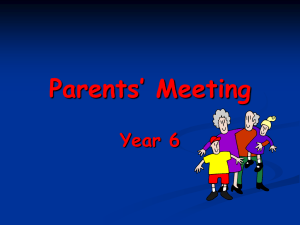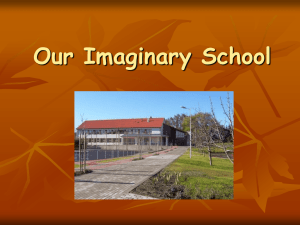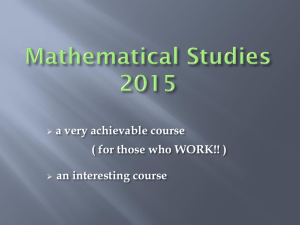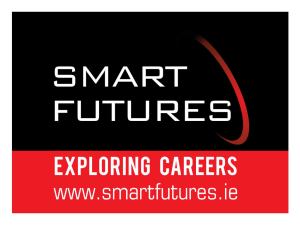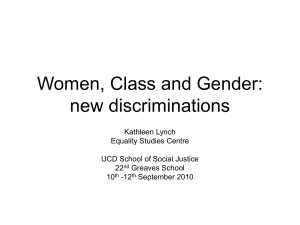Workshop slides Tech careers
advertisement
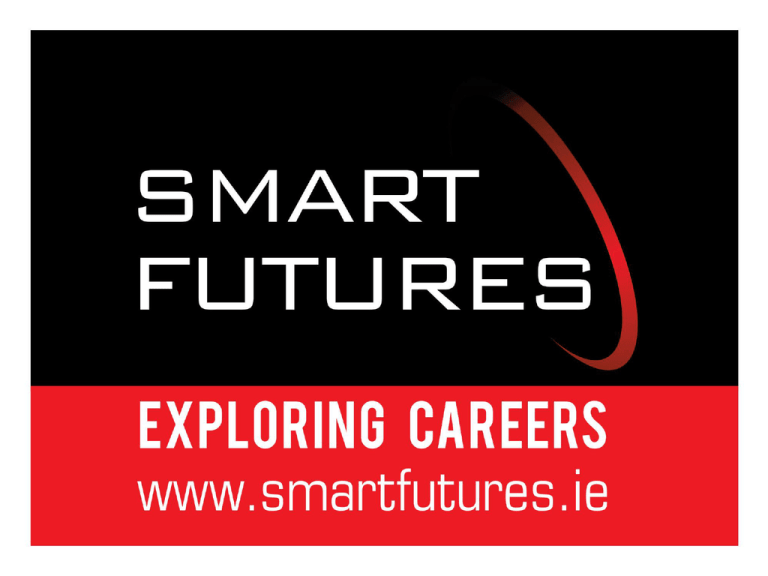
Introductions Your turn! • Introduce yourself (give 4 points about your career to-date). • Do you have previous experience of visiting a school/volunteering? • What do you hope to get from this session today? • Why did you choose ICT/technology as a career? What is the best thing about your job? Smart Futures • Smart Futures is a Government initiative working with industry, research and education partners to promote science, technology, engineering and maths (STEM) careers to post-primary students in Ireland. • Main aim is to improve the coordination of outreach resources and encourage students to consider/retain STEM subjects at post-primary and third level. • Objective is to grow awareness of what people working in STEM do and what skills they use/require. Smart Futures • Co-ordinated by the SFI Discover Programme partnering with the Engineer’s Ireland STEPS programme as well as PharmaChem Ireland, Royal Society of Chemistry, the Institute of Physics and ICT Ireland. What do we know? • Ireland's top 10 multinational employers include tech giants like Intel, IBM, HP, Microsoft, Apple and Google • 1000+ companies employ tech staff across multiple sectors like digital media, gaming, eRetail, life sciences, cybersecurity, financial services etc. • 105,000+ people employed in the tech sector in Ireland • 730+ Irish-owned digital technology companies • The European app economy worth €10billion+ and employs 800,00 people What do we know? • Starting salaries for science, tech and engineering graduates are between €24k- €31k • Analytics, Big Data, cybersecurity, mobile apps, cloud computing and high tech manufacturing identified as key growth areas • 86k people employed in physics-based jobs in Ireland • 52k+ people employed in Irish and multinational Life Sciences companies (in areas like Biotech, Medical Devices, Diagnostics, BioPharma etc). Why now? Higher + Ordinary 2014 Maths 52,381 Biology 32,957 Chemistry 8,604 (+5.5%) Agri Science 7,926 Physics 7,177 (+11%) Engineering 5,203 Applied Maths 1,706 (+7%) Technology 1,102 Challenges Benefits of Volunteering? Communication: consider your audience How would you present to a student group? • How to present to a primary school audience? • How to present to a post-primary school audience? • How is technology relevant to the group in question? • What questions would you expect from the group? Great public speaking is…? • Use humour, personal stories and conversational language – don’t patronise! • Practice with a timer and allow time for questions. • Project your voice, don’t mumble - be heard! • Be personable, ask students direct questions, use first names. • Connect with teacher pre-visit to agree content, pitch, age group etc. • Use ice-breakers and transform nervous energy into enthusiasm. • Experience builds confidence, which is the key to effective speaking. Volunteer Tips for Success Be yourself Keep it informal and avoid acronyms/ jargon! Connect with teacher before visit Bring/Use Props Consider your clothes, body language, and tone Reflect Praise, praise, praise Every idea is a good idea! Buddy up Enjoy! And now for your actual presentation…! Your name here Job title Company What is technology? Recognise anyone? works in technology? Technology Changing Our World Technology keeps us connected Computer science Maths Programming Hardware Apps Graphics Cloud computing Social Media Technology helps us look good Health Nutrition Cosmetics Sensors Manufacturing Medical Devices Technology helps produce safe food Biotechnology Food science Agriculture Microbiology Meteorology Manufacturing Technology helps us get there Materials Manufacturing Physics Maths Energy Transport GPS Technology helps us win! Sports science Biochemistry Physics Maths Data analysis Apps E-textiles Materials Technology saves lives Medical devices Pharmaceuticals Nanotechnology Immunology Maths Data analysis Technology in the developing world / protecting the environment Construction Energy Agriculture Communications Health Education Technology helps education Interactive learning Collaboration Research Communication Art and design Finance and cybersecurity Software Data analytics Physics Maths Forensics Cryptography Coding e-Commerce Digital Media Technology Music Film Television Radio Print Design Animation Publishing Internet Marketing What skills do people in technology need? Problem solving and critical thinking Teamwork and communication Creativity, Innovation, Curiosity MY STORY Job title Qualifications Why I chose to work in technology My typical working day… Benefits of working in technology Diversity Flexibility Travel the world Further training Solve problems QUESTIONS? End of your presentation! Dos and Don’ts Information on Child protection and other issues • Read and sign Smart Futures child protection sheet • Teacher must stay in the room at all times! What’s next? • Smart Futures takes requests for visits from schools • Indicate your availability and where you can travel to on sign up sheet • Smart Futures contacts you to arrange visits at a time that suits • Visits are evaluated by teacher and volunteer



